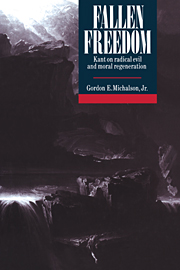1 - Ivan and Kant
Published online by Cambridge University Press: 15 December 2009
Summary
I wanted to discuss the suffering of humanity in general, but perhaps we'd better confine ourselves to the sufferings of children.
Ivan KaramazovA thoughtful person is acquainted with a kind of distress which threatens his moral fibre, a kind of distress of which the thoughtless know nothing: discontent with Providence which governs the course of this world. This distress he is apt to feel when he considers the evils which oppress the human species so heavily and, apparently, so hopelessly.
KantIvan's problem
In a famous passage in The Brothers Karamazov, Dostoyevsky has Ivan tell Alyosha about “a little girl of five who was hated by her father and mother, ‘most worthy and respectable people, a good education and breeding.’” So they “subjected her to every possible torture,” they “beat her, thrashed her, kicked her for no reason till her body was one bruise.”
Then they went to greater refinements of cruelty – shut her up all night in the cold and frost in a privy, and… smeared her face and filled her mouth with excrement, and it was her mother, her mother did this. And that mother could sleep, hearing the poor child's groans!
On February 20, 1987, The New York Times ran an article with the headline, “Mother Accused of Rape Role.”
- Type
- Chapter
- Information
- Fallen FreedomKant on Radical Evil and Moral Regeneration, pp. 13 - 29Publisher: Cambridge University PressPrint publication year: 1990



